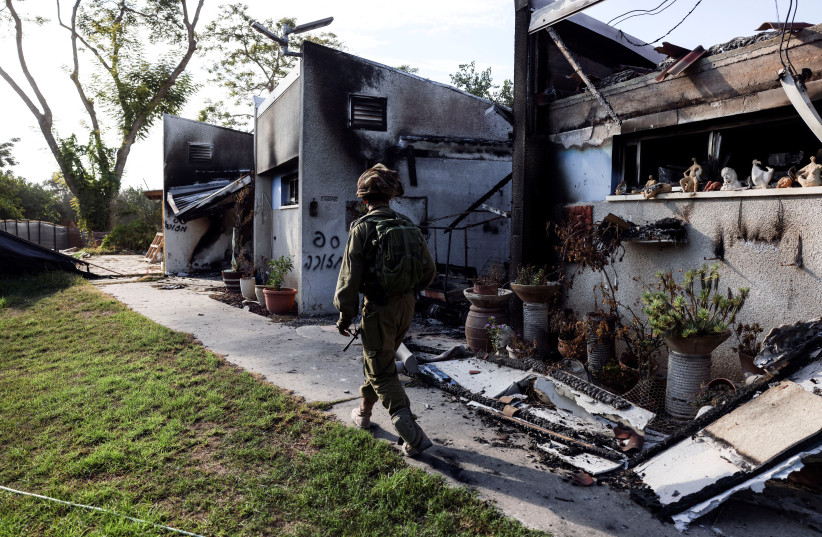On October 7, 2023, Israel faced the most brutal, gruesome, and deadly attack in its history. A coalition of radical Islamic terrorist groups, led by Hamas, invaded our land from the Gaza Strip, killing more than 1,200 people, wounding thousands more, and taking hundreds as hostages. They targeted civilians, soldiers, and even children celebrating Simchat Torah, one of our most joyous holidays. They burned families alive, beheaded babies, and brutally raped and mutilated young women.
They used rockets, drones, tunnels, and paragliders to carry out their assault, which they called the “Al-Aqsa Flood,” invoking a religious call to arms. Hamas violated the ceasefire arrangement that had been in place for years. They showed no mercy, no remorse, and no respect for human life on October 7.
Israel launched a large-scale military response, with the stated goals of destroying Hamas and bringing home our brothers and sisters held hostage. The Israel Defense Forces named the war “Swords of Iron.” However, last month, Israel’s Channel 11 reported that Prime Minister Benjamin Netanyahu was considering changing the name of the war, as he felt that “Swords of Iron” sounded more like the name of a military operation. According to
Channel 11, he was considering renaming the war “The Genesis War,” “The Gaza War,” or “The Simchat Torah War.”
Prime Minister Netanyahu reportedly considered changing the name of the war
The prime minister’s consideration of renaming this war is justified. The war’s name influences its perception and sentiment among Israelis and the global community, as well as its historical significance. But none of the names he is reportedly considering is suitable for this war. This war was not just an attack on Israel. It was an attack on our very existence, our identity, and our values. It was an attack on the Jewish people and the Jewish state – an attempt to destroy us.
One hundred days later, we are battling jihadists on seven different fronts (Gaza, Judea and Samaria, Lebanon, Syria, Yemen, Iraq, and Iran). It was an attack by radical Islamists on Western civilization, the world order, and the rule of law. It was an attack that must never be forgotten and never be repeated. That is why we should rename this war the October 7 War.

SOME MAY argue that this name is too simplistic, too narrow, or too provocative. They may prefer to use more neutral or generic terms, such as the “Israel-Hamas War” or the “Israel-Gaza War.” They may claim that these names are more accurate, more balanced, or more inclusive.
But these names are misleading, deceptive, and dangerous. They obscure the truth, distort reality, and undermine our cause. They imply that this war is a symmetrical conflict between two equal parties, with equal responsibilities and equal grievances. They imply that this war is a local dispute over a small piece of land, with no wider implications or consequences. They imply that this war is a normal occurrence, with no moral significance or historical context.
These implications are false, and we must reject them. We must not let our enemies, our friends, or ourselves forget the facts:
This war was started by Hamas and its radical Islamic accomplices, not by Israel. They initiated the aggression, they broke the ceasefire, and they bear full responsibility for the bloodshed.
This war is not about Gaza, Judea and Samaria, Jerusalem, the settlements, the refugees, the borders, or the peace process. October 7 was an attempt to destroy us. It is about the very existence of Israel and the right of the
Jewish people to live in our ancestral homeland with security and dignity.
This war is not a normal or inevitable event, but a rare and exceptional one full of horrors beyond our imagination. It is the first invasion of Israel since 1948 and the first war declared by Israel since 1973. It is a war that we did not want, did not seek, and did not provoke, but a war that we had to fight to defend ourselves and our future.
By calling this war the October 7 War, we honor the memory of those who fell on that fateful and horrific day and those who continue to fight and sacrifice themselves for our survival. We affirm the justice of our cause and the legitimacy of our actions. We remind the world of the true nature and origin of this war.
The implications of current conflict names are false
Our predecessors named the wars of 1948, 1967, and 1973 after the dates or events that marked their onset: the War of Independence, the Six Day War, and the Yom Kippur War. These names have become part of our collective consciousness and have shaped our national identity and destiny. They have also resonated with the international community and influenced its perception and response.
The October 7 War deserves the same recognition and respect. It is a defining moment in our history and a turning point in our destiny. It is a war that follows our tradition of naming our wars after the dates or events that sparked them and inspires our future of overcoming our enemies and securing our homeland. It is a war that we must win, and a war that we must name.
The writer is an Israeli attorney, activist, and businessman.
